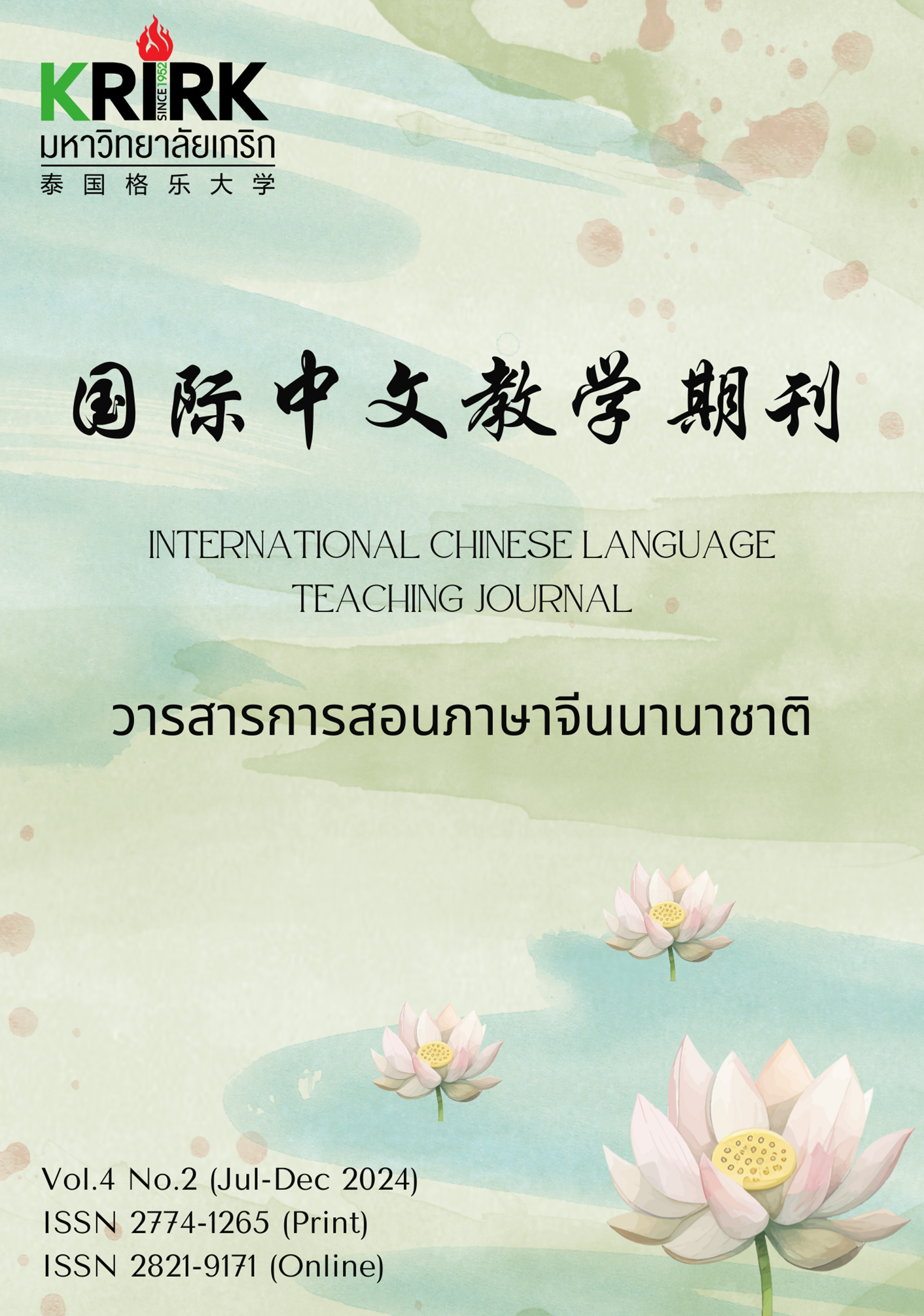二语课堂中的超语研究现状及其发展趋势: 基于中国知网的范围综述
关键词:
超语, 二语课堂, 国际中文教育, 范围综述摘要
超语是当前语言教育研究领域的热点话题之一。从2021年起,中国学术界开始逐步关注超语理论,本文以中国知网(CNKI)为数据来源,采用范围综述方法,对中国二语课堂中的超语研究现状和发展趋势进行梳理。研究发现:1)中国二语课堂中的超语研究虽然起步较晚,但是发展迅速;主题逐渐从基础理论探讨扩展到实践应用。在中国国内从2021年开始兴起,相关文献呈指数增长,特别是在2024年达到新高,表明学界对此问题的关注度迅速提高;2) 二语课堂中超语的研究热点主要有超语与理论发展、超语教学研究等,具体包括内容语言融合型教学(CLIL)、全英文教学环境中的知识建构,以及多语背景下的认同构建;3) 随着国际化和语言使用环境的变化,关于 “超语” 的理论和实践研究将继续深入,并可能影响语言教育的政策和教学方法;4) 超语理论为国际中文教育提供了新视角,超语教学在汉语作为第二语言的教学中具有重要的应用前景和理论价值。未来研究需加强超语与国际中文教育实践的融合,为多语环境下的教学改革提供创新路径。
参考
Chen, C. (2004). Searching for intellectual turning points: progressive knowledge domain visualization. Proceedings of the National Academy of Sciences, 101(suppl 1), 5303-5310.
Creese, A., & Blackledge, A. (2010). Translation in the bilingual classroom: A pedagogy for learning and teaching. The Modern Language Journal, 94(1), 103-115.
Cummins, J. (2000). Language, power, and pedagogy: bilingual children in the crossfire. London: Multilingual Matters.
Gao L., Tang, Y. (2021). Implementation of word cloud charts based on technology. Media and Art Research (3), 169-176.
García, O. (2011). Bilingual education in the 21st century: A global perspective. New York: John Wiley & Sons.
García, O., & Wei, L. (2014). Translanguaging: Language, Bilingualism, and Education. Singapore: Springer
Han, Y. (2020). The theory, practice, and inspiration of translingualism research. Journal of Xi'an International Studies University (2), 26-32.
Kirsch, C. (2020). Opening minds to translanguaging pedagogies. System, 92,102271.
Guo, Y., & Wang, Y. (2024). Exploring the effects of artificial intelligence applications on EFL students’ academic engagement and emotional experiences: A mixed-methods study. European Journal of Education.
Kramsch, C. (1993). Context and culture in language teaching. Oxford: Oxford University Press. Lewis, G., Jones, B., & Baker, C. (2012). Translanguaging: Origins and development from school to street and beyond. Educational Research and Evaluation, 18(7), 641-654.
Li, C., Lu, X. (2022). Research on boredom in foreign language learning: A scoping review-based method. Foreign Language Teaching (6), 70-76.
Li, W., Shen, Q. (2021). The origin, development, and prospects of super-linguistic practice theory. Foreign Languages (4), 2-14.
Li, Y., Peng, M. (2023). From second language to third language to cross-language: The enlightenment of contemporary super-lingual education on international Chinese education: an analysis based on SSCI journals. (eds.) 2023 Doctoral Forum on Teaching Chinese as a Foreign Language and the 16th Proceedings of the 2018 Postgraduate Academic Forum on Teaching Chinese as a Foreign Language (pp. 147-157).
Li, C., Chen, L., Ma, C., Zhang, S., & Huang, H. (2021). Strategy Use Among Chinese as Second Language Learners in Mainland China from the Mediation Theory Perspective. Frontiers in Psychology, 12, 752084.
Luo, L. (2024). "Lack of language": Language governance under the hyper-linguistic turn. Learning and Practice (7), 133-140.
Pan, H., Yuan Y. (2022). The development of superlanguage research and the new paradigm of foreign language education research. Foreign Language Teaching (5), 8-14.
Ren, W., Cai H. (2024). Attitudes of foreign language teachers in colleges and universities in my country towards super-language teaching and its influencing factors. Foreign Language Circle (1), 32-40.
Shen, Q., Chen, Z. (2024). China’s foreign language education planning from the perspective of super-linguistic practice: issues and paths. Foreign Language Circle (1), 14-22.
Song, Y. & Angel, M.Y.Lin. (2021). Research on the superlinguistic practice of teaching language for international students in China. Language Strategy Research (2), 56-66.
Sun, X., Zhou, X. (2022). Research on teachers’ superlinguistic behavior in content language integrated classrooms. Frontiers of Foreign Language Education Research (4), 69-76.
Wang, J., Chen, W. (2022). Theoretical orientation and philosophical origins of research on superlinguistic behavior. Chinese Foreign Languages (3), 69-76.
Wang, S., Pan, Z., Wang, Y. (2024). A mixed-methods investigation into complex components of multilingual international students’ self-regulated learning in English as a foreign language context: A social cognitive perspective. Learning and Motivation, 88, 102055.
Wang, Y., Huang, F., & Zhang, H. (2024). Modelling generative AI acceptance, perceived teachers’ enthusiasm and self-efficacy to English as a foreign language learners’ well-being in the digital era. European Journal of Education.
Wang, Y., Wu, H., Derakhshan, A., & Wang, Y. (2024). Development and validation of a generative AI-assisted attitude scale for Chinese university EFL learners. Journal of Beijing International Studies University, Issue 6 (forthcoming).
Wu, Y., Shao, H. (2014). Interpretation of Chinese learners of Chinese descent: a Singaporean perspective. Teaching Chinese in the World (2), 253-262.
Xu, H. (2024). Visual analysis of hyperlinguistic research based on knowledge graphs. Journal of Henan University (Social Science Edition) (4), 105-111.
Yuan, N., Zhou, N. (2015). Translinguistic skills: concepts, theoretical mechanisms, and research progress. Foreign Language World (2), 7-15.
Zheng, Y., An, N. (2022). A review of ten years of superlanguage research: theory, practice, and prospects.
##submission.downloads##
已出版
##submission.howToCite##
期
栏目
##submission.license##
##submission.copyrightStatement##
##submission.license.cc.by-nc-nd4.footer##





